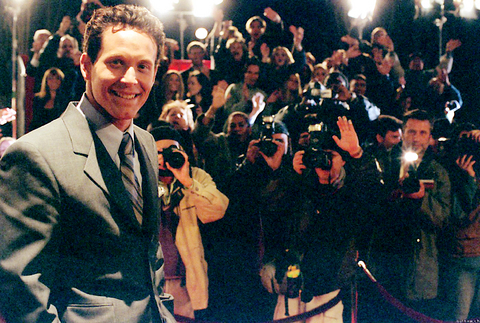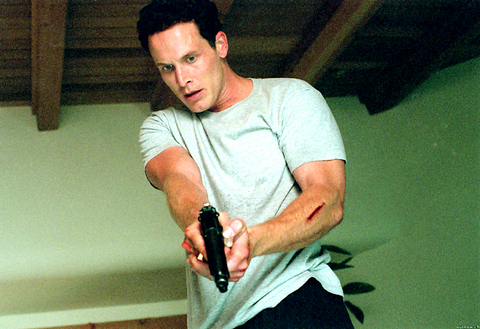Luckily for Mel Gibson, his last vanity project, The Passion of the Christ, has probably made enough money to cover the expense of his new one, Paparazzi. This amazingly arrogant, immoral film is almost certain to suffer a fast, richly deserved death at the box office.
Richly deserved death is, in fact, the theme of Paparazzi, which Gibson produced (with his partners Bruce Davey and Stephen McEveety) and to which he contributes a cameo appearance. The central character is Bo Laramie (Cole Hauser), a distinctly Gibsonesque action movie star whose works include Adrenaline Force and Adrenaline Force 2. Bo has been catapulted to overnight fame but remains a down-to-earth family man who still finds time to take his wife (Robin Tunney) and tow-headed son (Kevin Gage) to their weekly soccer game. He may live in a movie star compound in Malibu, but his beloved SUV still carries license plates from his beloved home state of Montana.
Having risen to fame without any contact with the press (word of Bo's fabulousness seemingly travels without the use of traditional media, perhaps through the ether), he's astonished at the Hollywood premiere of his new film to discover large numbers of people trying to take his photograph. Is he so new in town that he doesn't know what premieres are for?

PHOTO COURTESY OF FOX MOVIES
When one particularly loathsome member of the paparazzi (Tom Sizemore at his sleaziest) tries to take pictures of Bo's son at his soccer game, Bo punches him out. Taking his picture is one thing but endangering his family by publishing their photos is something else. (Sizemore's character works for Paparazzi, a magazine that appears to be aimed at professional kidnappers.) The vengeful photographer promptly vows "to destroy your life and eat your soul," in appropriately satanic language, and pretty much does just that by causing a hideous car wreck -- meant to suggest the death scene of Diana, Princess of Wales -- that lands both Bo's wife and child in the hospital, the latter deep in a coma.
With the tiresome justification business out of the way, the real fun can begin, as the outraged Bo sets out for some good old-fashioned American justice, vigilante-style. He coolly kills three of his antagonists, dropping one man over a mountain ledge, arranging for another to be shot to pieces by the Los Angeles Police Department and beating the third to death with a baseball bat. But for Sizemore's character, Bo has something even more exquisitely sadistic in mind.
As directed by the veteran hairstylist Paul Abascal (he fluffed Gibson's coif on all three Lethal Weapon films), Paparazzi has no time for fine ethical points. Bo never doubts his right to take the law into his own hands (a visit to a psychologist for an anger management session is treated as a joke -- Gibson is the next client waiting in the lobby). Nostrils flaring, Bo sets out on a campaign of murder that the film clearly endorses. After all, being a movie star doesn't just mean fancy houses and nice cars. According to Paparazzi, it also means you can kill with impunity.

PHOTO COURTESY OF FOX MOVIES

June 2 to June 8 Taiwan’s woodcutters believe that if they see even one speck of red in their cooked rice, no matter how small, an accident is going to happen. Peng Chin-tian (彭錦田) swears that this has proven to be true at every stop during his decades-long career in the logging industry. Along with mining, timber harvesting was once considered the most dangerous profession in Taiwan. Not only were mishaps common during all stages of processing, it was difficult to transport the injured to get medical treatment. Many died during the arduous journey. Peng recounts some of his accidents in

“Why does Taiwan identity decline?”a group of researchers lead by University of Nevada political scientist Austin Wang (王宏恩) asked in a recent paper. After all, it is not difficult to explain the rise in Taiwanese identity after the early 1990s. But no model predicted its decline during the 2016-2018 period, they say. After testing various alternative explanations, Wang et al argue that the fall-off in Taiwanese identity during that period is related to voter hedging based on the performance of the Democratic Progressive Party (DPP). Since the DPP is perceived as the guardian of Taiwan identity, when it performs well,

The Taiwan People’s Party (TPP) on May 18 held a rally in Taichung to mark the anniversary of President William Lai’s (賴清德) inauguration on May 20. The title of the rally could be loosely translated to “May 18 recall fraudulent goods” (518退貨ㄌㄨㄚˋ!). Unlike in English, where the terms are the same, “recall” (退貨) in this context refers to product recalls due to damaged, defective or fraudulent merchandise, not the political recalls (罷免) currently dominating the headlines. I attended the rally to determine if the impression was correct that the TPP under party Chairman Huang Kuo-Chang (黃國昌) had little of a

At Computex 2025, Nvidia CEO Jensen Huang (黃仁勳) urged the government to subsidize AI. “All schools in Taiwan must integrate AI into their curricula,” he declared. A few months earlier, he said, “If I were a student today, I’d immediately start using tools like ChatGPT, Gemini Pro and Grok to learn, write and accelerate my thinking.” Huang sees the AI-bullet train leaving the station. And as one of its drivers, he’s worried about youth not getting on board — bad for their careers, and bad for his workforce. As a semiconductor supply-chain powerhouse and AI hub wannabe, Taiwan is seeing